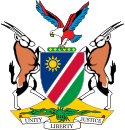- Constitution of Namibia
-
Namibia 
This article is part of the series:
Politics and government of
NamibiaConstitution
- Parliament
- National Council
- Chairman: Asser Kuveri Kapere
- Regions
- Constituencies
- National Assembly
- Speaker: Theo-Ben Gurirab
- National Council
- Government
- Judicial system
- Supreme Court
- Chief Justice: Peter Shivute
The Constitution of Namibia is the constitution of the Republic of Namibia. Adopted in February 1990, a month prior to Namibia's independence from apartheid South Africa, it was written by an elected constituent assembly.
Preamble
"Whereas recognition of the inherent dignity and the equal and inalienable rights of all members of the human family is indispensable for freedom, justice and peace; Whereas the said rights include the right of the individual to life, liberty and the pursuit of happiness, regardless of race, colour, ethnic origin, sex, religion, creed or social or economic status; Whereas the said rights are most effectively maintains and protected in a democratic society, where the government is responsible to freely elected representatives of the people, operating under a sovereign constitution and a free and independent judiciary; Whereas these rights have for so long been denied to the people of Namibia by colonialism, racism and apartheid; Whereas we the people of Namibia - have finally emerged victorious in our struggle against colonialism, racism and apartheid; are determined to adopt a Constitution which expresses for ourselves and our children our resolve to cherish and to protect the gains of our long struggle; desire to promote amongst all of us the dignity of the individual and the unity and integrity of the Namibian nation among and in association with the nations of the world; will strive to achieve national reconciliation and to foster peace, unity and a common loyalty to a single state; committed to these principles, have resolved to constitute the Republic of Namibia as a sovereign, secular, democratic and unitary State securing to all our citizens justice, liberty, equality, and fraternity. Now therefore, we the people of Namibia accept and adopt this Constitution as the fundamental law of our Sovereign and Independent Republic."[1]
External links
References
Constitutions in Africa Sovereign
states- Algeria
- Angola
- Benin
- Botswana
- Burkina Faso
- Burundi
- Cameroon
- Cape Verde
- Central African Republic
- Chad
- Comoros
- Democratic Republic of the Congo
- Republic of the Congo
- Côte d'Ivoire (Ivory Coast)
- Djibouti
- Egypt
- Equatorial Guinea
- Eritrea
- Ethiopia
- Gabon
- The Gambia
- Ghana
- Guinea
- Guinea-Bissau
- Kenya
- Lesotho
- Liberia
- Libya
- Madagascar
- Malawi
- Mali
- Mauritania
- Mauritius
- Morocco
- Mozambique
- Namibia
- Niger
- Nigeria
- Rwanda
- São Tomé and Príncipe
- Senegal
- Seychelles
- Sierra Leone
- Somalia
- South Africa
- South Sudan
- Sudan
- Swaziland
- Tanzania
- Togo
- Tunisia
- Uganda
- Zambia
- Zimbabwe
States with limited
recognitionDependencies and
other territories- Canary Islands / Ceuta / Melilla / Plazas de soberanía (Spain)
- Madeira (Portugal)
- Mayotte / Réunion (France)
- Saint Helena / Ascension Island / Tristan da Cunha (United Kingdom)
- Western Sahara
Categories:- Constitutions by country
- Politics of Namibia
- 1990 in Namibia
- African government stubs
- Namibia stubs
- Parliament
Wikimedia Foundation. 2010.
